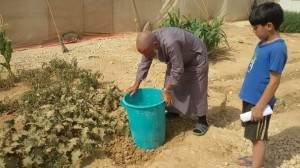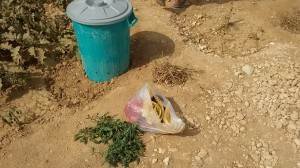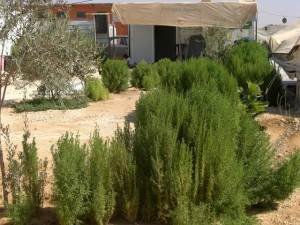By Miyako Hamasaka | PR Manager
In a densely populated Za’atari camp where JEN has been conducting support activities since 2012. Examples of the activities are: securing water, processing of sewage like domestic waste water, and disposing garbage from daily life the highest priority. In order to prevent the spread of infectious diseases and to maintain hygienic living environment.
JEN is working on the problem of such water and sanitation improvement in general, as the focal organization of the water and sanitation sector of 3 districts 1 out of the 12 districts of Za’atari refugee camp.
At this moment, as one of the new hygiene improvement initiatives, JEN began a pilot activity of compost making for weight loss of household waste from the early August. One family from each of the three districts participated in the attempt and learned the optimum conditions of materials and methods.
This is how to make compost:
- Cutting the bottom of garbage box of a household and bury it in the ground about 10cm;
- Putting garbage and weeds in it with water;
- Exposing the garbage to the air by stirring every day and,
- The worms that come out from the ground decompose the garbage by eating it.
Eventually, you can get the compost in two or three months.
This is the first experience for all of the three families, and they are trying to work on it with JEN staff’s advice during their weekly visits.
After one month, some results have been noticed in the attempts by each household. If the phenomena such as 'smelling' or 'flies' are seen, they have follow the instruction of the staff. Therefore, it seems that their understanding of the conditions, such as a position to install the garbage box, type and state of the material and frequency of stirring, is gradually deepened.
For Mr. Taral living in the camp for three years. He used to run agriculture in a town located in the southern part of Syria before evacuation, today he has planting vegetables, edible herbs, flowers, etc. on his site in the refugee camp. He said “the amount of garbage has decreased significantly” by participating in this activity, and also he carried on “I’ll continue this in the future and I'm looking forward to using the compost in vegetable garden in my own garden in Syria”.
Due to the camp location; where it is in the desert area, nearby the camp does not have a lot of green fields. So, Mr. Taral's garden may give a little peace to the residents.
The composting building project is the testing stage now, but the project has surely took step forward. We will carrying on the project until it is as usual, as we expect to see the comfortable enveronment amongust the refugees in the camp.
By Miyako Hamasaka | PR Manager
By Miyako Hamasaka | PR Manager
Project reports on GlobalGiving are posted directly to globalgiving.org by Project Leaders as they are completed, generally every 3-4 months. To protect the integrity of these documents, GlobalGiving does not alter them; therefore you may find some language or formatting issues.
If you donate to this project or have donated to this project, you can receive an email when this project posts a report. You can also subscribe for reports without donating.


